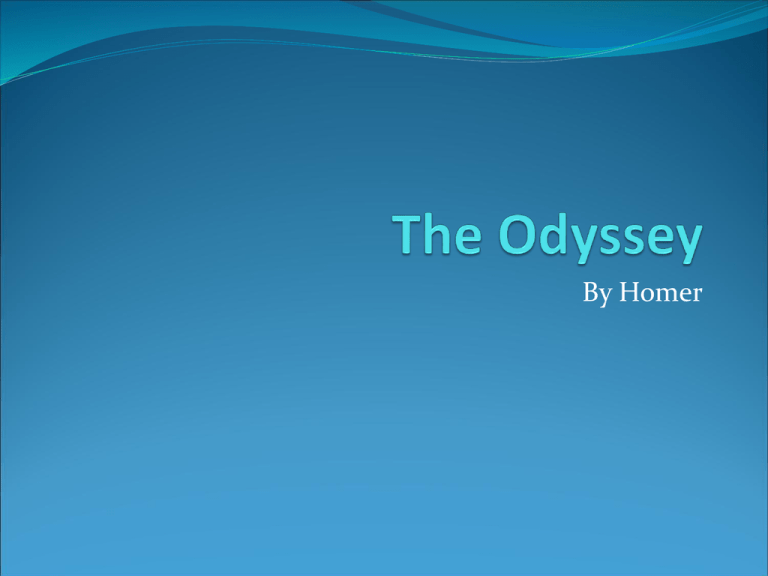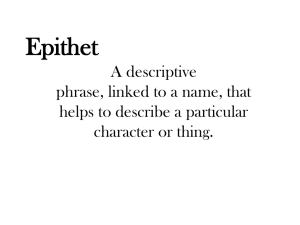The Odyssey
advertisement

By Homer Background The Odyssey is a sequel (the second book in a series). It is the second of Homer’s two great epic poems. Part one is called The Iliad. The Iliad The Iliad is the story of the Trojan War which might actually have taken place around 1250 B.C. This poem is a tale of myth and magic, not history. The gods and goddesses of ancient Greece are important characters. They take sides in the war and help the human characters. According to the myth, the war started this way: Paris was a prince in the city of Troy. Three goddesses asked him to judge who among them was the most beautiful. Aphrodite, the goddess of love, offered Paris a reward if he chose her. She said he could have Helen, the most beautiful woman in the world. One problem: Helen was married to Menelaus, the king of Sparta, a city in Greece. When Paris visited Sparta, Aphrodite made Helen fall in love with him. Helen ran away with Paris. Menelaus and his brother, Agamemnon, led a Greek army against Troy to bring her back. The war that followed is called the Trojan War after the name Troy. The Iliad takes place during the last months of the Trojan War. Its hero is Achilles, a mighty Greek warrior. The Iliad ends with the funeral of Hector, a Trojan hero who is killed by Achilles. The story tells of many heroes on both sides. One of the Greek heroes is named Odysseus. The Odyssey The Odyssey is named for Odysseus. Odysseus is the king of Ithaca, an island off the coast of Greece. According to the myth, Odysseus did not want to fight at Troy. He did not want to leave his wife, Penelope, and his baby son, Telemachus. Odysseus had to be tricked into joining the Greek army. Once he was involved in the fighting, however, he proved to be brave and clever. In fact, Odysseus thought of the trick that finally won the war for the Greeks. The Odyssey is mostly about Odysseus’ adventures after the Trojan War. In one adventure he makes an enemy of Poseidon, the Sea God. Poseidon punishes him by making him wander the seas, never allowing him to reach home. Invocation to the Muse An INVOCATION is a call for help or support. In ancient times, poets or artists would call upon a MUSE to help them write or create. A MUSE is a person or thing that inspires you to create. Ancient poets, such as Homer, would start their poems with an invocation to the Muse, or a call to help them create a great poem. Epic Poem or Story An Epic Poem or story is a larger-than-life story that contains many adventures or a long journey. Characteristics of an epic The setting is vast, covering great nations, the world, or the universe. The action consists of deeds of great valor or requiring superhuman courage. Supernatural forces—gods, angels, demons — interest themselves in the action. Characteristics of the Epic Hero EPIC HERO - a larger-than-life hero who embodies the values of a particular society. Characteristics: 1. An epic hero is superhuman. He is braver, stronger, smarter, and cleverer than an ordinary person is. 2. The epic hero is on a quest for something of great value to him or his people. 3. The villains that try to keep the hero from his quest are usually uglier, more evil, and more cunning than anyone we know in ordinary life. 4. The epic hero is often of mixed divine and human birth and so possesses human weaknesses. 5. The divine world (the gods) interferes with the human world. Terms used to talk about Epics Poet opens by stating the theme, invokes the Muse, and opens the narrative in medias res, giving necessary exposition later. Poet includes catalogs of warriors, ships, armies, etc. Extended formal speeches by the main characters. Poet makes frequent use of the epic simile. Epic simile: an elaborate comparison, involved and ornate. Also called the extended or Homeric simile. The Greek Virtues All Greeks were challenged to live by the virtues set by their culture. Breaking one of the Greek virtues meant angering the gods. The virtues were: Loyalty Hospitality Respect for the gods and goddesses Respect for all forms of life Courage Themes Respect for the Gods Respect for the gods is shown through the numerous descriptions of sacrifices and offerings. Disrespect for the gods inevitably leads to disaster; the gods do not forget disrespect and are not easily appeased. (Poseidon, Athena, Helios.) The Importance of Lineage Almost every time we meet someone significant, the narration pauses and we learn of the lineage. Many "things" we see also have a lineage or history that we are given - note Odysseus scar and his bow. Fate Fate is preordained by a power beyond that of even the gods. Paradoxically, it does not seem "random." A character's fate is tied up with his "character." Epithet A phrase that describes a person and connects to their name. Often seen in Homer’s epic poems. Epithets describe physical traits, lineage, or personality traits. Example: Odysseus, son of Laertes Sparkling-eyed Athena (Homer 7) List the epithets for the following characters: Odysseus (page 7) Calypso (page 7) Poseidon (page 7) Athena (page 17) Menaelus (page 18) Create your own Epithet Create your own epithet on a piece of paper. Write your name and create three epithets for yourself according to the following criteria A physical trait A personality trait Lineage Illustrate each of the epithets in a way that symbolizes the phrase within the epithet. Rubric for Grading the Epithet Project: Epithet depicts physical trait 15 Physical traits are illustrated in a symbolic way 10 Epithet depicts personality trait 15 Personality traits are illustrated symbolically 10 Epithet depicts lineage 15 Physical traits are illustrated in a symbolic way 10 Name is creatively written on the paper 10 85 total

